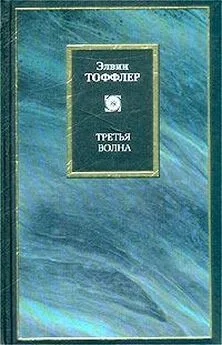Элвин Тоффлер - ТРЕТЬЯ ВОЛНА
- Название:ТРЕТЬЯ ВОЛНА
- Автор:
- Жанр:
- Издательство:ООО «Фирма «Издательство ACT»
- Год:2004
- Город:Москва
- ISBN:5–17–011040–5
- Рейтинг:
- Избранное:Добавить в избранное
-
Отзывы:
-
Ваша оценка:
Элвин Тоффлер - ТРЕТЬЯ ВОЛНА краткое содержание
Один из провозвестников «постиндустриального общества» Элвин Тоффлер, предсказавший многие черты современного общества еще в начале 80–х гг. прошлого века, в своем классическом труде раскладывает историю человечества на «технологические волны» (сравните с классиками политэкономии!). Одна технологическая волна сменяет другую, за сменой технологий происходит смена общественных формаций. По Тоффлеру, между социализмом в СССР и империализмом середины XX века в США особой разницы нет — и там, и здесь легко обнаружить черты индустриальной эпохи: централизованное жесткое управление и контроль и подавление социальной инициативы. У каждой технологический волны есть свой ключевой продукт, и могущество стран и общественных объединений зависит от обладания и контроля над ним. В древнем обществе и средних веках таким продуктом была земля, в индустриальную эпоху — товарные рынки сбыта и сырье. В постиндустриальном обществе, в фазе Третьей технологической волны ключевым продуктом становится информация. Тоффлер анализирует тенденции и делает великолепные прогнозы, часть из которых на наших глазах становятся реальностью. Преображаются все аспекты жизни общества: социальные взаимосвязи, государственное устройство, политика, медиарынок, даже семья и воспитание. Зарождается цивилизация будущего, которая во всех отношениях будет иной, но ее зерна можно увидеть уже сегодня…
ТРЕТЬЯ ВОЛНА - читать онлайн бесплатно полную версию (весь текст целиком)
Интервал:
Закладка:
SCIENCE/TECHNOLOGY Anderson, Robert H., and Nake M. Kamrany. Advanced Computer–Baaed Manufacturing Systems for Defense Needs. (Marina del Rey, Cal: USC, Information Sciences Institute, 1973.) The Application of Computer Technology for Development. United Nations, Department of Economic and Social Affairs, Second Report of the Secretary–General. (New York, 1973.) Appropriate Technology in the Commonwealth, A Directory of Institutions. Food Production & Rural Development Division, Commonwealth Secretariat. (London, 1977.) Appropriate Technology in the United States: An Exploratory Study. Study conducted by Integrative Design Associates for the National Science Foundation RANN program. (Washington, D.C.: U.S. Government Printing Office, 1977.) Asimov, Isaac. /, Robot. (New York: Fawcett Crest, 1950.) -. Understanding Physics, Vol. Ill, The Electron, Proton, and Neutron. (New York: New American Library, Signet, 1966.) Baldwin, J., and Stewart Brand, eds. Soft–Tech. (New York: Penguin Books, 1978.) Boorstin, Daniel J. The Republic of Technology: Reflections on Our Future Community. (New York: Harper & Row, 1978.) Brand, Stewart, ed. Space Colonies. (New York: Penguin Books, 1977.) Buchholz, Hans, and Wolfgang Gmelin, eds. Science and Technology and the Future, Parts 1 and 2. (Munich: K. G. Saur, 1979.) Butterfield, Herbert. The Origins of Modern Science: 1300–1800. (New York: Free Press, 1957.) Cardwell, D. S. L. Turning Points in Western Technology. (New York: Neale Watson Academic Publications, Science History Publications, 1972.) Gross, Nigel, David Elliot, and Robin Roy, eds. Man–Made Futures: Readings in Society, Technology and Design. (London: Hutchinson, 1974.) Einstein, Albert. Ideas and Opinions, trans. Sonja Bargmann. (New York: Dell, Laurel. Copyright Crown, 1954.) Ellis, John. The Social History of the Machine Gun. (New York: Pantheon Books, 1975.) Etzioni, Amitai. Genetic Fix. (New York: Macmillan, 1973.) Farago, F. T. Handbook of Dimensional Measurement. (New York: Industrial Press, 1965.) Farrington, Benjamin. Head and Hand In Ancient Greece: Four Studies In the Social Relations of Thought. (London: Watts, Thinker's Library, 1947.) Feyerabend, Paul. Against Method: Outline of an Anarchistic Theory of Knowledge. (London: NLB, Verso, 1975.) Fidel, Oscar H., ed. Ideas in Science. (New York: Washington Square Press, Reader's Enrichment, 1966.) Ford, Henry. My Life and Work. (New York: Doubleday, Page, 1923.) H. B. Maynard and Company. Production: An International Appraisal of Contemporary Manufacturing Systems and the Changing Bole of the Worker, ed. Rolf Tiefenthal. (London: McGraw–Hill, 1975.) Harper, Peter, and Godfrey Boyle, eds. Radical Technology. (New York: Pantheon Books, 1976.) Heppenheimer, T. A. Colonies in Space. (Harrisburg, Pa.: Stackpole Books, 1977.) Howard, Ted, and Jeremy Rifkin. Who Should Play God? The Artificial Creation of Life and What It Means for the Future of the Human Race. (New Yoik: Dell, 1977.) Illich, Ivan. Tools for Conviviality. (New York: Harper & Row, 1973.) Jacobs, Jane. The Economy of Cities. (New York: Random House, 1969.) Klein, H. Arthur. The World of Measurements. (New York: Simon and Schuster, 1974.) Kranzberg, Melvin, and Carroll W. Parsell, Jr. Technology In Western Civilization, Vol. I. (New York: Oxford University Press, 1967.) Kuhn, Thomas S. The Structure of Scientific Revolutions. (Chicago: University of Chicago Press, 1962.) Lawless, Edward W. Technology and Social Shock. (New Brunswick, N. J.: Rutgers University Press, 1977.) Lilley, Samuel. Men, Machines and History. (New York: International Publishers. 1966.) Mazlish, Bruce, ed. The Railroad and the Space Program: Ал Exploration In Historical Analogy. (Cambridge, Mass.: MIT Press, 1965.) Needham, Joseph. Science and Civilization in China, Vol. I, Introductory Orientations. (Cambridge: Cambridge University Press, 1965.) -. Science and Civilization in China, Vol. II, History of Scientific Thought. (Cambridge: Cambridge University Press, 1969.) Newman, James R., ed. What Is Science? (New York: Washington Square Press, 1961.) Nicolis, G., and I. Prigogine. Self–Organization in Nonequllibrium Systems: From Disslpatlve Structures to Order Through Fluctuations. (New York: John Wiley, Wiley–Interscience, 1977.) Nikolaev, L. Space Chemistry, trans. Y. Nadler. (Moscow: Mir Publishers, 1976.) O'Neill, Gerald K. The High Frontier: Human Colonies In Space. (New York: Bantam Books, 1978.) Pyke, Magnus. Technological Eating, or Where Does the Fish–Finger Point? (London: John Murray, 1972.) Ritner, Peter. The Society of Space. (New York: Macmillan, 1961.) Schey, John A. Introduction to Manufacturing Processes. (New York: McGraw–Hill, 1977.) Schofield, Robert E. The Lunar Society of Birmingham: A Social History of Provincial Science and Industry In Eighteenth–Century England. (Oxford: Oxford University Press, 1963.) Sharlin, Harold I. The Convergent Century: The Unification of Science In the Nineteenth Century. (New York: Abelard–Schuman, 1966.) Sorenson, James R. Social Science Frontiers, Vol. 3, Social Aspects of Applied Human Genetics. (New York: Russel Sage Foundation, 1971.) Stine, G. Harry. The Third Industrial Revolution. (New York: G. P. Putnam's Sons, 1975.) Sullivan, Walter. We Are Not Alone: The Search for Intelligent Life on Other Worlds. (New York: McGraw–Hill, 1964.) U.S. Department of Labor. Technological Change and Manpower Trends In Five Industries: Pulp and Paper/Hydraulic Cement /Steel/'Aircraft and Missile/Wholesale Trade. (Washington, D.C.: U.S. Government Printing Office, 1975.) Warshofsky, Fred. Doomsday: The Science of Catastrophe. (New York: Reader's Digest Press, 1977.) Watson, James D. The Double Helix: A Personal Account of the Discovery of the Structure of DNA. (New York: New American Library Signet Books, 1968.)
SOCIALISM/COMMUNISM Amalrik, Andrei. Will the Soviet Union Survive until 1984? (New York: Harper & Row, Perennial Library, 1971.) Brus, Wlodzimierz. The Economics and Politics of Socialism: Collected Essays, irons. Angus Walker (Chapter 3–6). (London: Routledge & Kegan Paul, 1973.) Christman, Henry M., ed. Essential Works of Lenin. (New York: Bantam Books, Matrix, 1966.) Howe, Irving. The Basic Writings of Trotsky, (New York: Random House, Vintage Books, 1965.) Laider, Harry W. History of Socialism. (New York: Thomas Y. Crowell, 1968.) Marx, Karl, and Friedrich Engels. The Communist Manifesto. (Harmondsworth, Middlesex: Penguin Books, 1967.) Nicolaus, Martin. Restoration of Capitalism in the USSR. (Chicago: Liberator Press, 1975.) Nordhoff, Charles. The Communistic Societies of the United States. (New York: Schocken Books, 1965.) Possony, Stefan T., ed. The Lenin Reader: The Outstanding Works of V. I. Lenin, (Chicago: Henry Regnery, Gateway, 1969.) Revel, Jean–Francois. The Totalitarian Temptation, trans. David Hap good. (Harmondsworth, Middlesex: Penguin Books, 1978.) -. Without Marx or Jesus, trans. J. F. Bernard. (London: Paladin, 1972.) Smelser, Neil J., ed. Karl Marx on Society and Social Change, with Selections by Friedrich Engels. (Chicago: University of Chicago Press, 1973.) Smith, Hedrick. The Russians. (New York: Quadrangle/New York Times, 1976.) Socialism Theory and Practice, Soviet Monthly Digest of the Theoretical and Political Press, January 1976. (Moscow: Novosti Press Agency.) Trotsky, Leon. Political Profiles, trans. R. Chappell. (London: New Park Publications, 1972.) -. The Revolution Betrayed, trans. Max Eastman, 5th edition. (New York: Pathfinder Press, 1972.) Wesson, Robert G. The Soviet State: An Aging Revolution. (New York: John Wiley, 1972.)
SOCIOLOGY/SOCIAL THEORY Bird, Caroline. The Crowding Syndrome: Learning to Live with Too Much and Too Many. (New York: David McKay, 1972.) Bottomore, T. B. Sociololgy: A Guide to Problems and Literature. (London: George Alien & Unwin, 1962.) Chappie, Eliot Dismore, and Carleton Stevens Coon. Principles of Anthropology. (New York: Henry Holt, 1942.) Davis Kingsley, Harry C. Bredemier, and Marion J. Levy. Modern American Society. (New York: Rinehart, 1950.) Etzioni, Amitai. The Active Society: A Theory of Societal and Political Processes. (New York: Free Press, 1968.) -, and Eva Etzioni, eds. Social Change: Sources, Patterns, and Consequences. (New York: Basic Books, 1964.) Greer, Colin, ed. Divided Society: The Ethnic Experience in America. (New York: Basic Books, 1974.) Harris, Marvin. The Rise of Anthropological Theory: A History of Theories of Culture. (New York: Thomas Y. Crowell, 1968.) Isaacks, Harold R. Idols of the Tribe. (New York: Harper & Row, 1975.) Karner, Abram, and Edward Preble. They Studied Man. (Cleveland: World Publishing, 1961.) Moore, Wilbert E. The Professions: Roles and Rules. (New York: Russell Sage Foundation, 1970.) Packard, Vance. A Nation of Stranges. (New York: David McKay, 1972.) Raison, Timothy, ed. The Founding Fathers of Social Science. (Harmondsworth, Middlesex: Penguin Books, 1969.) Toffler, Alvin. Future Shock. (New York: Bantam Books, 1971.)
TIME/SPACE Abler, Ronald, et al. Human Geography in a Shrinking World. (Belmont, Cal.: Duxbury Press, 1975.) Blainey, Geoffrey. The Tyranny of Distance. (Melbourne: Sun Books, 1971.) Clay, Grady. Close–Up: How to Read the American City. (New York: Praeger, 1973.) Coleman, Lesley. A Booh of Time. (London: Longman, 1971.) Dean, Robert D., William H. Leahy, and David L. McKee, eds. Spatial Economic Theory. (New York: Free Press, 1970.) de Grazia, Sebastian. Of Time, Work and Leisure. (New York: Twentieth Century Fund, 1962.) Fraser, J. T., ed. The Voices of Time. (New York: George Braziller, 1966.) -, F. C. Haber, and G. H. Millier, eds. The Study of Time. (New York: Springer–Verlag, 1972.) Gould, Peter, and Rodney White. Mental Maps. (Baltimore: Penguin Books, 1974.) Gribbin, John. Timewarps. (New York: Delacorte Press/Eleanor Friede, 1979.) Haggett, Peter, and Richard J. Chorley. Network Analysis in Geography. (New York: St. Martin's Press, 1969.) Morrill, Richard L. The Spatial Organization of Society. (Belmont, Cal.: Duxbury Press, 1970.) Needham, Joseph. Time and Eastern Man, the Henry Myers Lecture 1964, Royal Anthropological Institute Occasional Paper No. 21. (Glasgow: Royal Anthropological Institute of Great Britain & Ireland, 1965.) Norberg–Schulz, Christian. Existence. Space & Architecture. (New York: Praeger, 1971.) Sandow, Stuart A. Durations: The Encyclopedia of How Long Things Take. (New York: Times Books, 1977.) Tooley, R. V., Charles Brisker, and Gerald Roe Crone. Landmarks of Mapmahing. (Amsterdam: Elsevier, 1968.) Welch, Kenneth F. Time Measurement: An Introductory History. (Newton Abbot, Devonshire: David & Charles, 1972.) Whitrow, G. J. What is Time? (London: Thames and Hudson, 1972.)
WORK/EDUCATION Andersen, Dennis, and Mark W. Leiserson. Rural Enterprise and Non–farm Employment. (Washington, D.C.: World Bank, 1978.) Barlett, Laile E. New Work/New Life. (New York: Harper & Row, 1976.) Best, Fred, ed. The Future of Work. (Englewood Cliffs, N.J.: Prentice–Hall, 1973.) Bowman, Jim, et al. The Far Side of the Future: Social Prob lems and Educational Reconstruction. (Washington, D.C.: World Future Society, 1978.) Dickson, Paul. The Future of the Workplace: The Coming Revolution in Jobs. (New York: Weybright and Talley, 1975.) Evans, Archibald A. Flexibility in Working Life: Opportuni ties for Individual Choice. (Paris: Organisation for Economic Co–operation and Development, 1973.) Gates, Arthur I., et al. Educational Psychology, a revision of Psychology for Students of Education. (New York: Macmillan, 1942.) Good, H. G. A History Western Education. (New York: Macmillan, 1947.) Kanter, Rosabeth Moss. Social Science Frontiers, Vol. 9, Work and Family in the United States: A Critical Review and Agenda for Research and Policy. (New York: Russel Sage Foundation, 1977.) Poor, Riva, ed. 4 Days. 40 Hours: And Other Forms of the Re arranged Workweek. (New York: New American Library, Mentor, 1973.) Roberts, Paul Craig. Alienation and the Soviet Economy: Toward a General Theory of Marxian Alienation, Organization Principles, and the Soviet Economy. (Albuquerque: University of New Mexico Press, 1971.) The Shorter Work Week. Papers delivered at the Conference on Shorter Hours of Work sponsored by the AFL–CIO. (Washington, D.C.: Public Affairs Press, 1957.) Wells, H. G. The Work, Wealth and Happiness of Mankind. (London: William Heinemann, 1932.)
Читать дальшеИнтервал:
Закладка:









